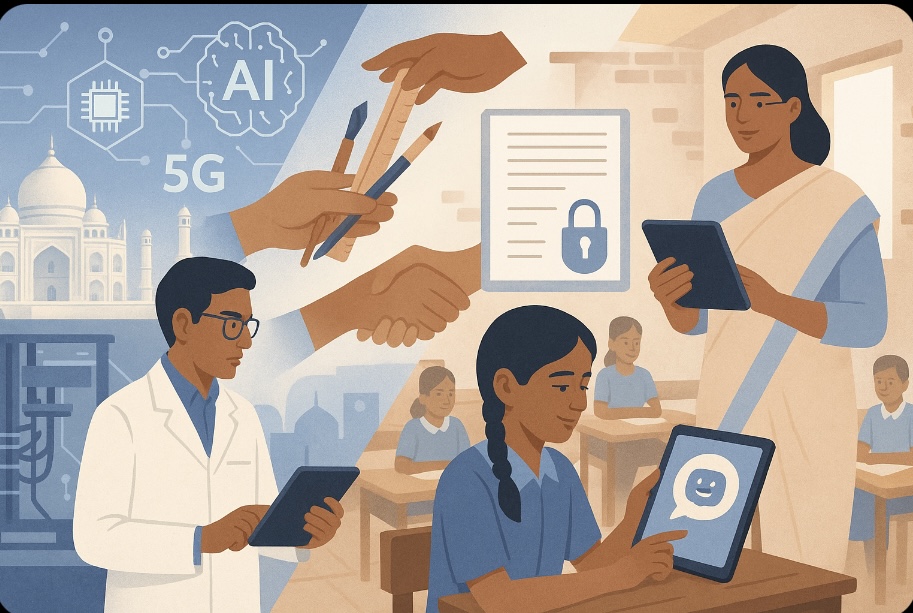The shifts happening across education and AI aren’t future-forward—they’re already here. From rural schools to international research labs, we’re witnessing strategic moves that aren’t just innovative—they’re inclusive, intentional, and ready to redefine what teaching and learning look like.
India Launches National AI and Quantum R&D Hub
India has opened a 100,000-square-foot Centre of Excellence in Bengaluru, positioning Visvesvaraya Technological University (VTU) at the center of the country’s AI and quantum research strategy. Funded by the Department of Telecommunications and the Telecom Centre of Excellence, the new hub operates on a hub-and-spoke model designed to connect academia, startups, and industry for high-impact collaboration.
-
Projects span quantum computing, 5G/6G, AR/VR, robotics, and healthcare tech.
-
The government emphasized turning research into real-world application to support both urban and rural development.
-
The initiative supports national programs like “Make in India” and AI-driven workforce upskilling.
Why it matters:
India isn’t waiting for permission—it’s claiming its space in global tech leadership by investing in homegrown innovation. This move provides a model for how universities can drive national transformation through AI and R&D.
Nonprofits Develop Their Own AI to Close Global Education Gaps
While tech giants dominate headlines, nonprofits are building something different—AI tools for the people, by the people. These open-source, culturally aware systems are making education possible in refugee camps, rural areas, and disconnected communities where traditional models fall short.
-
Ferby, a multilingual chatbot co-created with MIT and Harvard, helps non-English speakers navigate learning environments.
-
Mercy Corps is piloting SMS-powered learning for areas with little or no internet.
-
The World Institute on Disability is developing AI that supports localized sign languages and neurodiverse learners.
Why it matters:
This isn’t just innovation—it’s liberation. These organizations are flipping the script, ensuring that AI doesn’t replicate inequality but helps repair it. They’re building education tools with dignity and cultural relevance at the center.
Australian Universities Warned AI Is Undermining Research Integrity
Australia’s higher education regulator, TEQSA, has issued formal guidance on the risks posed by generative AI to academic research (AFP/ABC News, 2025). The guidance raises serious concerns about the quality and reliability of AI-generated work and the potential for data corruption.
- TEQSA warned that unverified or proprietary training data can “poison” research outputs, introducing risks related to accuracy, privacy, and security.
- The agency is encouraging universities to adopt greater AI transparency and require oral defenses to validate student research.
- Monash University has banned AI use in theses, while other institutions are developing new governance protocols.
- These recommendations mirror international efforts to preserve academic trust in AI-assisted environments.
Why it matters:
As AI becomes more deeply embedded in research workflows, the risk of manipulation or low-quality outputs grows. Without clear policies and transparency, institutions risk compromising the credibility of both student work and institutional research.
U.S. Teachers Receive $23M in AI Training Backed by Microsoft & OpenAI
The American Federation of Teachers (AFT) is leading the charge with a national training hub to help educators bring AI into the classroom—backed by $23 million in funding from Microsoft, OpenAI, and Anthropic.
-
Teachers will learn how to use AI for lesson planning, differentiated instruction, and student feedback.
-
The hub offers workshops, resources, and guidance on safe, ethical AI integration.
-
AFT emphasized its commitment to educator-led governance, even as Big Tech backs the project.
Why it matters:
This isn’t just professional development—it’s professional empowerment. As AI reshapes how students learn, teachers must be equipped to lead—not just adapt. And now they’re getting the tools to do just that.
💡 Unexpected Highlight
Nonprofits are no longer just filling gaps—they’re leading the charge in equitable AI design. Their community-rooted approaches are setting a new bar for what global edtech can and should look like.
🔍 Themes to Watch
-
Equity: AI tools are being built for the world, not just the West.
-
Accountability: Universities are tightening ethical standards around AI in research and classrooms.
-
Capacity Building: Strategic training hubs and research ecosystems are becoming the new backbone of global education.
Betting on Shared Intelligence
From India’s innovation hubs to low-bandwidth AI tools in refugee camps, this moment reminds us that intelligence is best shared. AI isn’t just a tool—it’s a test of how we steward opportunity. The goal isn’t to automate education—it’s to elevate it.
Let’s not sit this one out.
This is the time to build, to train, to teach—and to make sure every voice is part of the conversation.
📚 References
AFP/ABC News. (2025, July 8). Australian university regulator warns generative AI is “poisoning data” in research. https://www.abc.net.au/news/2025-07-08/australian-university-regulator-generative-ai-research-warning/102976480
Denis, C. (2025, July 11). AI models aren’t made equal. Some nonprofits are creating their own tools instead. Business Insider. https://www.businessinsider.com/nonprofits-ai-tools-edtech-global-inequities-2025-7
Time. (2025, July 10). The AI industry is funding a massive AI training initiative for teachers. https://time.com/7301335/ai-education-microsoft-openai-anthropic/
Times of India. (2025, July 11). New Visvesvaraya Technological University centre to boost research in next‑gen technology. https://timesofindia.indiatimes.com/city/bengaluru/new-visvesvaraya-technological-university-centre-to-boost-research-in-next-gen-technology/articleshow/122372116.cms
About the Author
Lynn F. Austin is an author, speaker, and educator dedicated to helping others achieve their highest potential. With a strong foundation in faith, Lynn combines her expertise in business, doctoral work in AI strategy and innovation in higher education, and a deep passion for growth and development. Her proven leadership in education and innovation makes her a trusted speaker, coach, and business consultant.
A valued voice in both academic and business circles, Lynn is a frequent writer on AI in higher education and the author of The BOM: Betting on Me, The Newman Tales series, and other business, motivational, and faith-based books. She empowers professionals, educators, and students alike to thrive with purpose and lead with wisdom.

